
Blogging Tips for Local Businesses
Blogging is one of the most used ways to promote services and products for any business.
However, it is essential to know WHY you need to blog, HOW you can reap the benefits of blogging, and WHAT you can do to make blogging a smooth and exciting journey for your business.
In this article, let’s give you nine tips to help you answer all your questions on blogging.
9 Blogging Tips for Local Businesses To Achieve The Best Results
1. To Spread Brand Awareness
Like any other business, local businesses need blogs to make people aware of their brand. By writing blogs of relevance targeting the right audience, brands expand their customer base.
Blogs are an excellent way to arouse interest in your potential clients and provide valuable information about your industry, products, and services. It sends out a signal to Google and your audience that your company knows why it is established.
Blogging builds authority and helps SEO ranking.
Tips To Follow:
- Talk about the reasons why you started the business.
- Let them know about the details of your products and services.
- Illustrate how your brand is offering better services than other brands.
- Include the latest research and results of the products/services you provide.
Here’s an example of a blog that explains new software features to customers:

2. To Connect With Your Readers
The primary purpose of writing blogs is to connect with your local audience. To assure them that your business is there to support them by providing so and so service.
Besides, blogging helps solve customer queries about the service or products.
Your blogs can answer customer questions and reduce the tedious task of attending customer care calls.
Tips To Use:
- Integrate social media into your blogs. So that people will be able to share the blogs on their social media handles.
- Stay active on social media to connect with your audience using reels, stories, and posts.
- You can also email campaigns to keep your readers updated about your products/services through the latest blogs.
- Read the feedback and reply to the comments timely.
Here’s an example of a blog with social media icons integrated into it:

3. To Increase Traffic On Your Site
The ultimate purpose of a business is to make profits. Therefore, when done systematically, blogging can prove to be of the highest benefit. It can increase your site traffic manifold leading to an increase in sales.
There are several strategies to increase traffic on your site that you can follow. After all, an increase in website traffic is important for local businesses.
Tips to follow:
- Spend on writing quality blogs instead of spending on Ads as blogs will help grab organic traffic.
- Convert your blogs into an eBook, reel, YouTube video, Facebook post and reap numerous benefits from a single blog post.
- Build quality links through blogs to develop authority in your industry.
- Seek your customer’s email addresses and slide into their inbox with gift services such as exclusive pdf to your blog or handbook. Later, use this email list for your marketing campaign.
Here’s an example of a CTA in a blog that seeks the email address of customers:
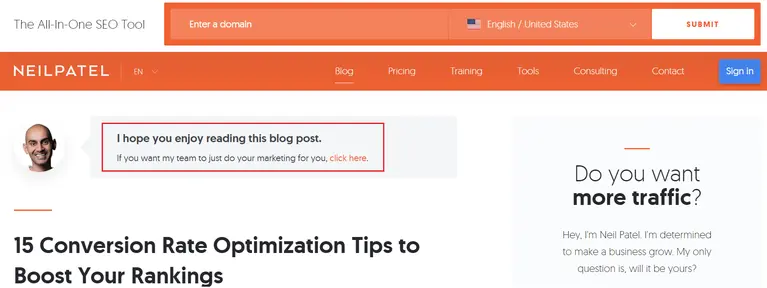
How Can You Reap The Benefits Of Blogging?
1. By Becoming A Go-To Source For Information In Your Niche
Well, who wouldn’t want to be remembered by the service/product one provides? This can happen only when you are setting a benchmark for your business.
Your business needs to provide value to the customer to stand out from the crowd. If the customer can identify your expertise in a field and associate your name with the desired service, then you have achieved the purpose of blogging.
For example,
If you have to read about digital marketing and someone says to name someone whose site has a lot of orange colors. What name would come to your mind?
Neil Patel is an expert in digital marketing and can be associated with this industry quite easily. He has established authority in the field by publishing numerous blogs, eBooks, social media posts over the years.
Pro Tip:
- If you cannot do so yourself, look for experts in your field and hire them to write on relevant topics.
- You can also guest post on other relevant sites in your industry and attract their traffic to your site.

2. By Posting Regularly Using Relevant Keywords
Keyword research is one of the most crucial parts of blog writing. You might have many ideas to write on, but it can be all fruitless if no one is searching for such ideas.
So, it is vital to look for keywords people are searching for in your industry. Write about things people need answers for. Make them land on your website each time they look for a product/service that your site can offer.
Tools to use:
- Google Keyword Planner is the go-to platform for SEO analysts for keyword research. It is a free tool and gives enough data to kickstart your blogging journey.
- Ubersuggest is a fantastic tool that provides relevant keywords and questions people seek answers pertinent to your keyword.
- BuzzSumo is another site that will help you analyze keywords, keyword density, and other blog parameters.
Here’s a screenshot of Ubersuggest:
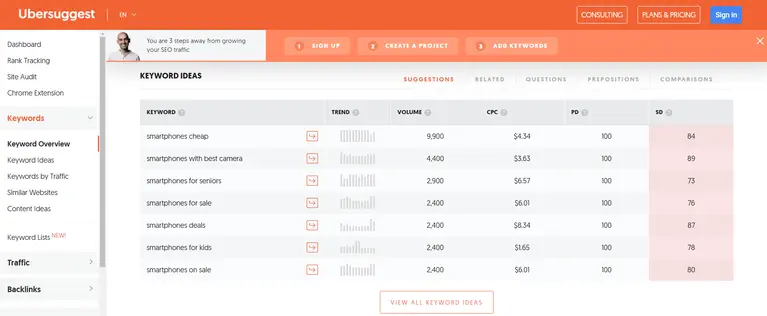
Read: Benefits of Using Long-tail Keywords for SEO
3. By Seeking Inspiration From Competitors
Competitors are not there to steal your thunder. They are there to make you even better at what you do. So, observing the growth and tactics of your competitors can make you learn from their mistakes and improve on your strategies.
Besides, neglecting the competition can be useless as you will not know what people enjoy. See your competitors as your best friends and your worst enemies. Get inspired from them and take constructive criticism whenever possible.
Tips:
- Look at the most viewed or shared content on your competitor’s site. Develop something similar on your website. Make sure you add something not already mentioned on your competitor’s blog.
- Look at their keyword rankings and backlink profile. Use tools such as SEMrush or SpyFu for this step.
- Add content categories that your competitor misses. Remember, you have to provide value to the customer. So, fill the gaps that your competitor could not fill.
- Don’t hesitate to write about your competitor in your blogs. Appreciate them or add constructive criticism for them in your blog.
Here’s a screenshot of SEMrush performing keyword and backlink analysis of a competitor website:
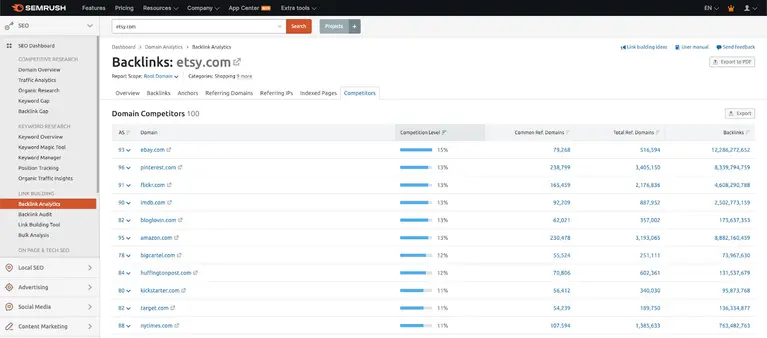
What Can You Do To Make Your Blogs Interesting?
1. Solve Customer Queries By Writing Specific And Relatable Posts
Would you contact a person who is never able to solve your query? Of course not. The same rule applies to website content, blogs, services, or products. Whatever you provide needs to be very audience-centric.
Keep your target audience in mind while creating the content—answer the questions not answered by your competitors or anyone on the internet.
Tools to use:
- Answer the Public is a fantastic tool to get an idea about what to write.
- Look at the end of the SERP, where there are various suggestions after entering a search query. You can pick some topics from such results and do quick keyword research.
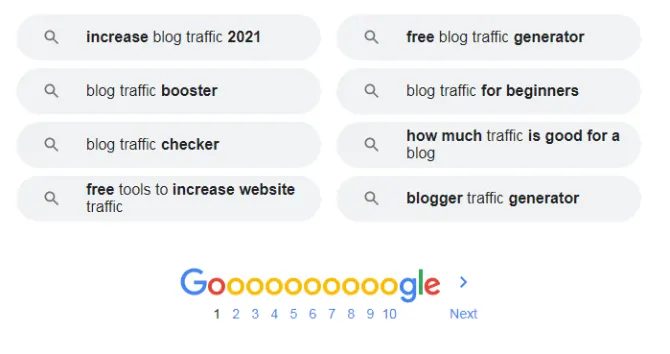
- Use social media features such as polls, question answers, quizzes to know about the customer’s needs.
Here’s a screenshot of Answer the Public:
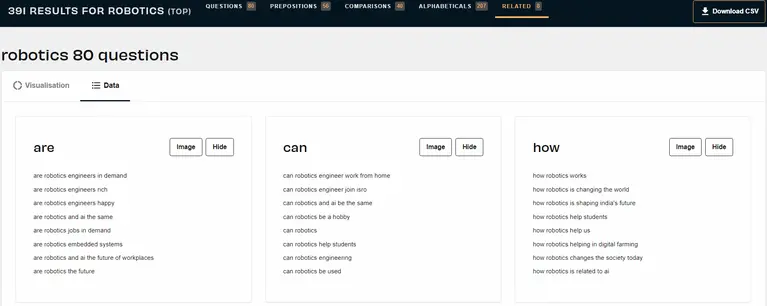
2. Stay Up-To-Date And Use A Variety Of Media
Publishing blogs on similar topics with texts can distract the readers and add monotony. Therefore, it is advisable to talk about your industry and other things that might affect it.
Staying up-to-date helps in diversifying the content of the blogs and allowing the audience to understand the workings of your industry.
Additionally, your blogs would help the customers stay up-to-date about the particular industry.
For that, your blogs need to stay updated about various industries and find creative ways to express your company’s opinions about the regular changes that happen in the world of your industry.
Tips:
- Use Canva or Venngage to build infographics to break the monotony while providing valuable information to your audience.
- Find memes and GIFs that can express your emotions or opinion about something in an appropriate way.
- Add YouTube videos or self-made videos of your industry or business to give a holistic experience to the customers.
Here’s a screenshot of Canva:

3. Write Using Simple Language
Remember, you are making blogs to help customers understand your product/services. Blogs are a way to dig deep into the topics you share expertise in.
Therefore, writing in simple language to send your message across is the best you can do. Opt for writing a conversational blog post to engage with your audience as much as possible.
Tools to use:
- Hemingway Editor is a widely used tool by content writers that help identify the difficulty level of reading the write-up. You can set the level of language according to your target audience.
- Quilbot is a great tool to rephrase your sentences if you find it challenging to use more straightforward language.
- Grammarly is a one-stop destination for all writers as it provides everything you need to produce a good quality blog.
Here’s an example of Quillbot:

Key Takeaways
- Prepare blog content that helps increase brand awareness.
- Build content that helps you connect with your readers.
- Spend time and money on blogs for organic traffic.
- Become an expert in your industry.
- Post regularly by using relevant keywords.
- Get inspired from your competitors, analyze their growth, and take advantage of their left gaps.
- Produce blogs that solve the queries of customers.
- Upload fresh, relevant, and up-to-date content using a variety of mediums.
- Use simple language as much as possible.
ABOUT THE AUTHOR:
Brice Decker

Brice has been handling marketing projects for more than 12 years and he is providing consulting services on SEO, Social Media and PPC. He has a huge expertise in working at large corporations including Accenture Interactive & PwC Digital Services.
Related Post
Tips to Choose Local SEO Agency
Common Google My Business Mistakes
Effect of Covid on Local Marketers
Video Marketing for Local Businesses
Pr Outreach for Local Businesses
Tips to Rank on Google Local 3-Pack
Metrics to Track in Local SEO Audit
SMM Benefits for Local Businesses
Local SEO Tips to Drive Foot Traffic
How Local SEO Firm Save Your Money
Local 3-Pack for Small Businesses
Content Type That Helps Local SEO
Offline Advertising Tips for Local Businesses
Tips to Handle Local Competition
Tips to Gain Quality Links for Local SEO
Promote Local Businesses Using Instagram
Increase Site Speed of Local Businesses
Do Local Businesses Need a Website
Business That Benefit From Local SEO
Technical SEO for Local Businesses
Optimize for Google Local 3-Pack
Hyperlocal Marketing for Business Growth
Tips to Promote Local Biz on Facebook
Local SEO Mistakes Moving Companies Make
Local Business Directories Benefits and Tips to Use
ABOUT THE AUTHOR:
Brice Decker

Brice has been handling marketing projects for more than 12 years and he is providing consulting services on SEO, Social Media and PPC. He has a huge expertise in working at large corporations including Accenture Interactive & PwC Digital Services.
Related Post
Tips to Choose Local SEO Agency
Common Google My Business Mistakes
Effect of Covid on Local Marketers
Video Marketing for Local Businesses
Pr Outreach for Local Businesses
Tips to Rank on Google Local 3-Pack
Metrics to Track in Local SEO Audit
SMM Benefits for Local Businesses
Local SEO Tips to Drive Foot Traffic
How Local SEO Firm Save Your Money
Local 3-Pack for Small Businesses
Content Type That Helps Local SEO
Offline Advertising Tips for Local Businesses
Tips to Handle Local Competition
Tips to Gain Quality Links for Local SEO
Promote Local Businesses Using Instagram
Increase Site Speed of Local Businesses
Do Local Businesses Need a Website
Business That Benefit From Local SEO
Technical SEO for Local Businesses
Optimize for Google Local 3-Pack
Hyperlocal Marketing for Business Growth
Tips to Promote Local Biz on Facebook
Local SEO Mistakes Moving Companies Make
Local Business Directories Benefits and Tips to Use